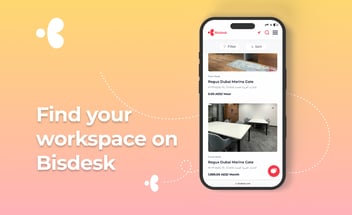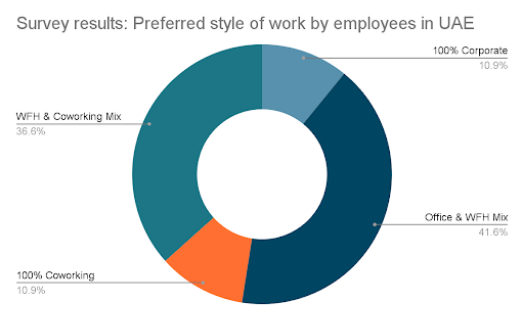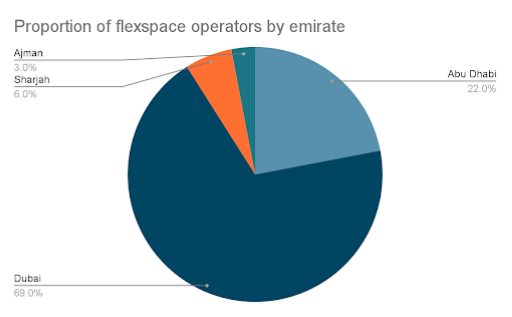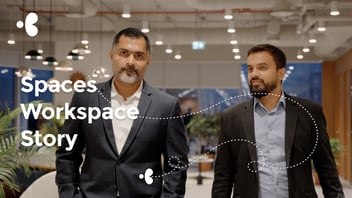
Co working Flex Space Managed workspaces
Flex space Coworking taking over office space rentals
In uncertain times, the only remedy is more and more flexibility, say experts
The UAE’s coworking industry is growing at a dramatic pace. Expert opinions point towards an increased convergence of office spaces into flex space models. A post lockdown revival has accelerated several companies' transition towards a “hybrid workspace” model and many others are likely to follow suit. According to the latest Bisdesk.com industry report, flex space trends will be prominent in 2022.
Increase in flexspace demand are likely to give substandard operators a hard time due to the increase in market inventory and overall rise in quality standards within the industry, however, as per the recent market study conducted by Bisdesk, all major signs indicate a continued expansion of flexspace supply and demand within the Middle East.
Pandemic’s role in the disruption of work
During 2020, the epidemic disrupted global labor markets, forcing millions of workers to be furloughed or lose their jobs. As offices closed, others quickly adapted to working from home. The most visible effect of COVID-19 on the labor force has been the huge increase in the number of employees working remotely. Because of the global success of this redesigned work model, companies across the UAE are actively preparing to transition to flexible workspaces, which will lower overall space requirements and bring fewer people into offices each day while increasing demand for flexspace solutions within the region.
“The pandemic has undoubtedly catalyzed (flexspace’s) widespread adoption” quipped Mr. Ali Hamdan, Team Lead Area Sales Manager of Regus UAE, during his interview.
Flexspace - A major value add for UAE’s freelancers and startups
Dubai is one of the world's most hospitable cities for new businesses. Startups in their early stages prefer to work out of co-working spaces, incubators, and accelerators because they benefit from lower costs, peer learning, and shared, flexible resources. Business centers or serviced offices are now a favoured option for start-ups or enterprises that have evolved beyond the concept stage but still want operational flexibility without significantly increasing real estate costs.
Operations & Marketing Manager of Unbox Community, Ms. Nadine Gharzeddine added, “The new normal WFH has boosted our business significantly as companies quickly realized how efficient it is to utilize our full fledged services that provides superior benefits in terms of value of money, flexibility, sense of community, reliable support services and networking opportunities.”In the UAE, coworking is predicted to boom in the next 1 to 5 years. Flexspace serves as an important pillar of the coworking phenomenon. It has played a major role in propagating collaboration and innovation. It has reduced costs and promoted greater employee satisfaction which is one of the most important factors in any business today.
Increased adoption from larger enterprises
Flexspace industry leader and General Manager of WeWork UAE, Riad Thoumas sums up the change in market dynamics in his recent comments during an interview series conducted by Bisdesk. “Now I think companies understand very well that if you want to attract and retain talent you need to offer them something more than a desk or an office. You need to be part of something bigger” he added.
Managed offices model is generally preferred by large and mid-sized corporates who want enterprise solutions, but with flexibility. Co-working model is highly preferred by start-ups who largely look for flexibility. The new age sought after flexspace solution is an amalgamation of both concepts, called the “hybrid” flexibility model. In the UAE, we are now seeing similar trends come to fruition. The supply and take up of hybrid space is slowly filtering into the UAE, a market that is almost by design perfectly suited for this purpose.
The modern workplace is becoming a flexible business service that can actively support growth, rather than a fixed and often (to the occupier) financially onerous physical product. This repositioning is alluring to the occupier and is quickly becoming a demand default. Rafees Rahmathulla, CEO of Bisdesk - UAE’s largest aggregator of flexspace operators, is extremely bullish on the prospects of hybrid workspace solutions gobbling up exponentially more commercial real estate percentage in the coming years. “Bisdesk data shows an increase in corporate take up of coworking products. Flexspace future is wide open.” he commented.

Traditional commercial landlords open to flexspace opportunities
As GCC economies relax regulations and pivot to becoming more open economies, there will be implications for the UAE’s economy and occupier sector. Whilst there will be some challenges due to anticipated consolidation, we expect that “space as a service” in the form of serviced office solutions will play a crucial role in the occupier sector. It is clear that there is a structural change occurring within commercial real estate and to some extent, this has been happening for some time in the UAE. The Associate Sales Head of reputed serviced office provider The Executive Center underlined this change in his recent comments,”We found that people don’t want to sign into longer leases anymore and typically fit out less spaces. (Ours is) a turnkey solution and it gives clients the flexibility to dictate terms as they do not need to sign in for a longer lease”
Proportion of flexspace operators by Emirate
- Abu Dhabi 22%
- Dubai 69%
- Sharjah 6%
- Ajman 3%

Companies across the globe have shifted to a hybrid, if not fully remote work schedule. As a result, businesses and individuals are looking for flex space: A smaller, close-to-home workspace that can be accessed as much or as little as one needs. Flex space will be part of every professional’s future due to the pervasive hybrid work model, high rates of adoption, and the changing nature of work. Marketing Specialist at Astrolabs UAE believes that this shift has a lot to do with the increased knowledge of employers about coworking model’s cost saving attributes in multiple angles. “We realized that we don't need a physical office space where employers had to spend tremendous amounts of money and employees had to spend on average 22 hours per month just commuting between home and office, (which is almost an entire day a month)” he added.
Overall outlook
Bisdesk’s studies indicate that growth within the UAE market’s flexspace sector will be underpinned by the easing of visa restrictions, which allows easier and lower company formation costs for startups. Greater demand for flexible space is expected as the regional economies open-up, which will only further entrench project-led business practices and thus corporates’ desire for more flexible space across the region.
Rafees Rahmathulla, CEO of Bisdesk.com summed up the market outlook succinctly in his comment, “The new world of work is hybrid.”

